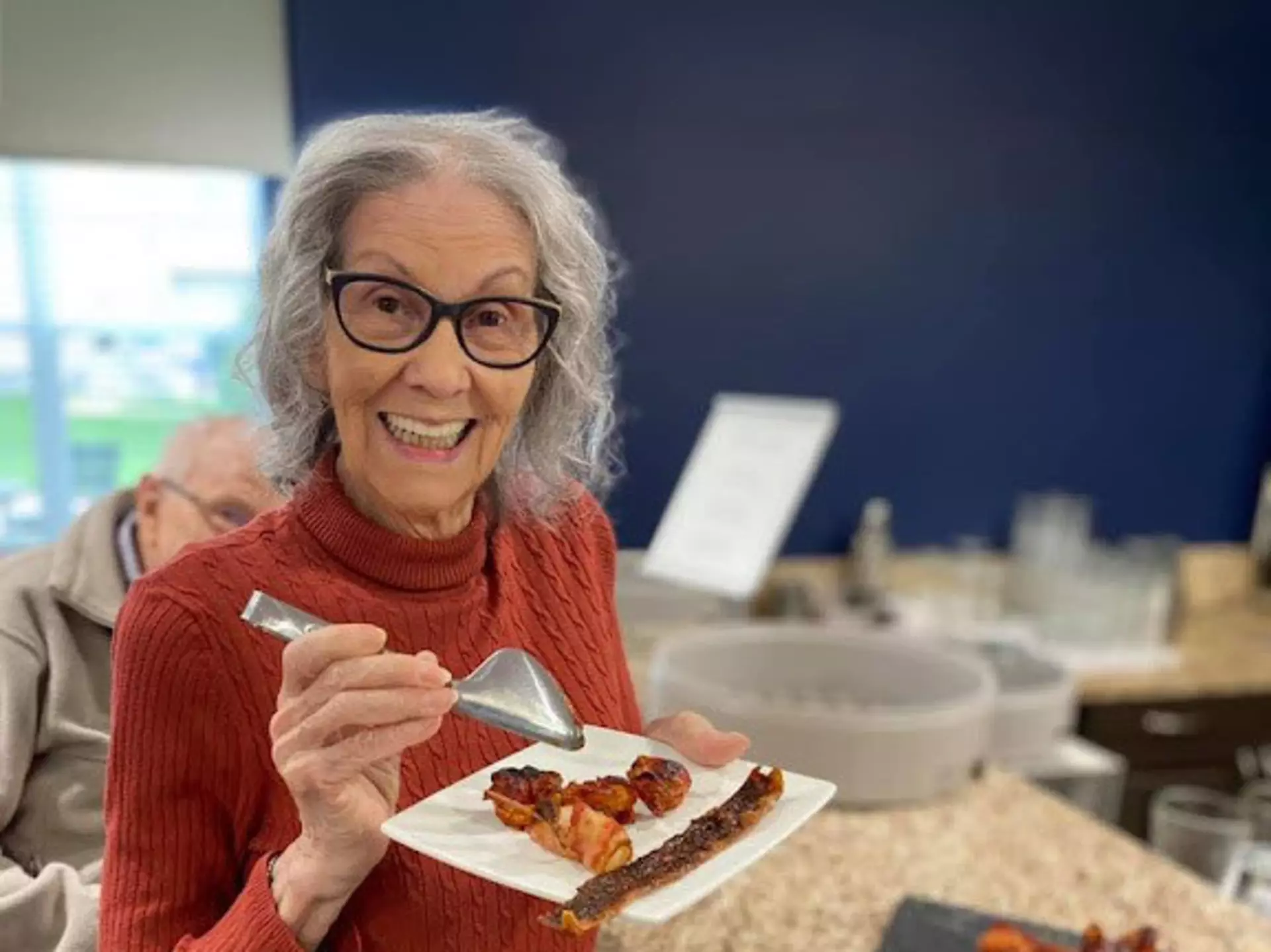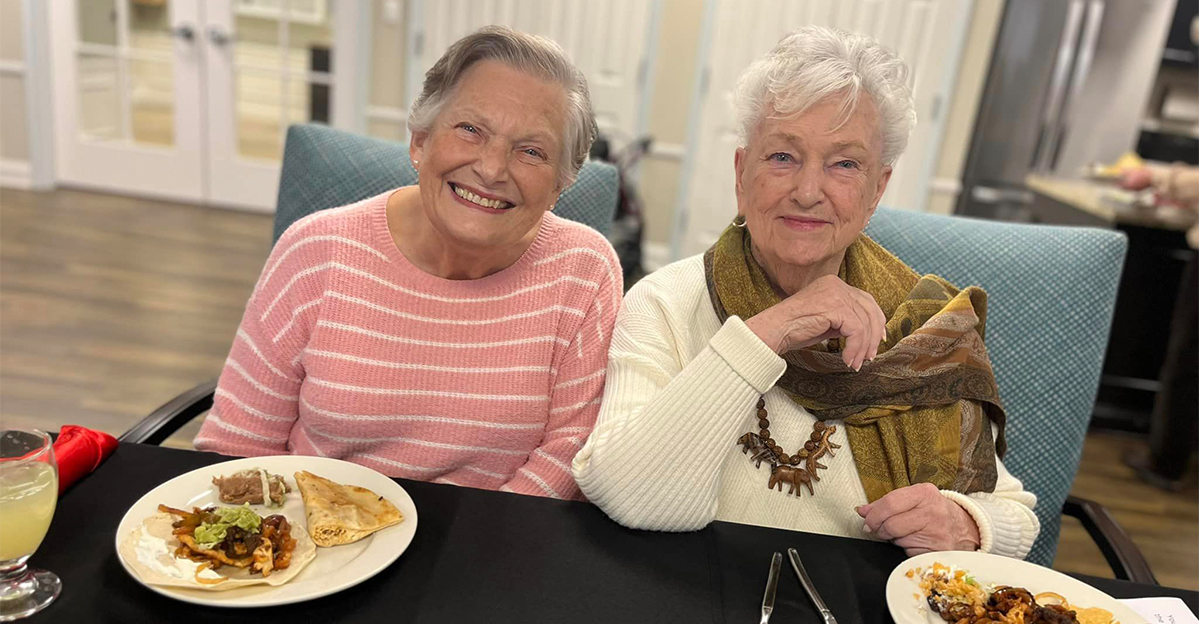Numerous studies have shown that eating a well-balanced diet is essential for healthy living. However, some age-related changes, like slower metabolism or a reduced sense of taste and smell, may cause some older adults to lose interest in foods they once enjoyed. Low appetite often makes it harder for individuals to meet their bodies’ nutritional requirements, leading to sudden weight loss or malnutrition.
In some cases, a decline in appetite may indicate an underlying health condition, especially if accompanied by other symptoms. If you notice a sudden change in your loved one’s appetite, it’s usually a good idea to speak to their doctor about it first.
In this blog, we’ll discuss how to increase appetite in seniors. We’ll also share some healthy, appetite-boosting foods you can try and proven strategies to help make mealtimes more enjoyable for yourself or someone you love.
Why Does Loss of Appetite Happen and What Effects Does It Have?
When you notice a loved one is eating less than they used to, it’s natural to wonder: Is loss of appetite in old age normal? Several important issues may lead to lower appetite among seniors, including:
- Slower metabolism
- Reduced sense of taste or smell
- Dental issues
- Certain medications
- Chronic health conditions
- Depression or anxiety
- Memory conditions, like dementia or Alzheimer’s disease
- Lack of physical activity
- Gastrointestinal issues
- Social isolation
- Dehydration
A lower appetite can negatively impact a senior’s health and well-being in many ways, including:
- Unexpected weight loss
- Low energy levels
- Nutritional deficiencies (malnutrition)
- Weakened immune system
- Slower wound healing
- Increased risk of falls and injuries
- Cognitive decline or trouble concentrating
- Higher risk of hospitalization or complications from existing health conditions

Strategies to Improve Appetite in Seniors
It’s normal to feel unsure about what to do when you or someone you love doesn’t want to eat. Still, there are many things you can do to make meals more appealing for yourself or someone you care for.
Here are some science-backed strategies for ways to increase appetite in seniors naturally:
Add More Flavor
As we age, some foods that we once enjoyed no longer taste as good. This is often caused by a declining sense of smell and taste, which may sometimes lead to a lower interest in eating.
To make dishes more flavorful and enjoyable, try adding fresh herbs like mint, basil, or lemon zest, depending on what you like. Consider umami-rich foods like mushrooms, aged cheese, and kimchi. If you like spicy food, consider using mild spices like cinnamon, ginger, or paprika for a gentle kick of warmth. Along with making food more colorful and aromatic, herbs and spices often provide plenty of health benefits!
Smaller, More Frequent Meals
Large portions of food can feel overwhelming as an individual’s appetite declines. Sometimes, a person may feel hungry less often or full as soon as they begin eating. If a loved one is losing interest in food, offering smaller, more frequent meals throughout the day can help ensure they meet their body’s nutritional requirements.
To help maximize nutritional intake, prioritize high-calorie, energy-dense foods like dairy, fruits, vegetables, and whole grains. You can also add healthy snacks, like a granola bar or a handful of nuts.
Prioritize Easy-to-Chew Foods
Some seniors may have trouble chewing due to age-related changes or illness. For instance, weaker jaw muscles, missing teeth, or conditions like arthritis may make chewing painful. In these circumstances, opt for foods that are easier to bite and chew, like soft-cooked vegetables, scrambled eggs, or oatmeal. You can also blend foods like soups, smoothies, or mashed fruits to make them tastier and easier to digest.
Oral issues, such as gum disease, tooth pain, or ill-fitting dentures, can make eating difficult for seniors. If someone you care about is affected, it’s important to visit a doctor or dentist to get the problem checked and fixed.
Make Mealtimes More Enjoyable
Making mealtimes more exciting can help boost appetite. For instance, you might switch between different foods to keep things interesting. Plate dishes using therapeutic colors, or add simple garnishes to make food more appealing. And like everything, mealtimes are often better with loved ones! If a senior you love is losing their appetite, encourage grandkids or other family members to join for meals to help make mealtimes more enjoyable.
Talk With Your Doctor
Some age-related health conditions, such as dysphagia or gastrointestinal issues, may make it harder for older adults to chew or swallow food. If you’re unsure about how to increase appetite in seniors, it might be a good idea to speak with your doctor. They can help catch and address any underlying health issues that may be causing eating problems. Sometimes, a doctor may recommend appetite stimulants, such as megestrol or dronabinol, to help boost your appetite.

The Best Foods to Increase Appetite in Seniors
If someone you love leaves food on their plate regularly or skips meals entirely, they may have a low appetite. Because of this, it’s essential to focus on nourishing and satisfying meals and snacks that can increase their appetite and keep them energized throughout the day.
Here are some healthy and delicious options you may try:
Protein
Protein supports many essential functions, including maintaining muscle strength and boosting the immune system, which can be particularly beneficial as we age. Some potent sources of protein that are excellent for seniors with a low appetite may include poultry, eggs, fish, and Greek-style yogurt.
Many protein sources can be adapted to suit you or your loved one’s taste and chewing ability, making them excellent foods for seniors with no appetite. For example, you may shred or blend pork or chicken to make them soft and easy to digest. Eggs can be enjoyed as mini quiches, scrambled, soft-boiled, or in an egg salad. Try adding shredded chicken or soft lentils to soups and stews for a tasty and protein-rich dish.
Healthy Fats
Healthy fats help the body absorb vitamins and support healthy brain function. Foods packed with these nutrients usually taste great, which may make them more enjoyable.
Furthermore, they can help you feel satisfied without eating large portions, making them perfect for someone with a low appetite. Try spreading peanut or almond butter on toast or slices of fruit. Avocados, a popular source of healthy fats, can be enjoyed with toast, blended into smoothies, or mixed into egg salad.
Grains and Starches
Grains and starches are rich in carbohydrates, which fuel the body. Many tasty and filling carbs can be made palatable for seniors with a low appetite or who may struggle with chewing.
You can cook oats with full-fat milk for extra creaminess, mix mashed lentils with butter or cheese for a filling meal, or try mashed potatoes topped with cheese or mushroom gravy.
Fruits and Vegetables
In addition to supporting healthy nutrition, adding fruits and vegetables to your diet is a good way to boost your appetite. Colorful veggies, like spinach, sweet potatoes, carrots, and bell peppers, are more visually appealing and are packed with essential nutrients. Try steamed spinach with mashed sweet potatoes or blend them into a soup.
Fruits contain natural sugars, which many people enjoy. Soft options, like bananas or ripe peaches, are often easier to chew and swallow. You can also mash or stew apples, pears, or berries, or blend them into smoothies with yogurt or milk to add some flavor and extra nutrients.
High-Calorie Liquids and Semi-Liquids
Many foods can be enjoyed as liquids, which is helpful for someone with a low appetite or eating problems. If someone you love has trouble chewing or swallowing, or just finds food less enjoyable, drinking meals can be more manageable while still giving them the nutrition they need.
For example, you can blend yogurt, fruit, and nut butter to make a tasty and filling smoothie. You can pack as many ingredients as you desire, making it an effective way to include many vitamins and nutrients in one meal.
Try Our Daily Routine
If you’re wondering how to increase appetite in seniors, having consistent meal times can help signal to the body when it’s time to eat. Here’s a simple routine you may try.
Feel free to switch meal options with your favorite healthy alternatives. It’s also a good idea to avoid any foods you’re allergic to or those that may interact with your current medications.
| Time | Meal Idea |
|---|---|
| 7:30 a.m. - Light Breakfast | A warm bowl of oatmeal topped with sliced bananas and a drizzle of honey for natural sweetness. Wash it down with a glass of fortified milk or a flavored protein shake. |
| 10:00 a.m. - Mid-Morning Snack | Greek yogurt paired with a handful of strawberries or raspberries. |
| 12:30 p.m. - Lunch | Scrambled eggs with spinach and cheese, served with half an avocado and a slice of whole-grain toast with herbal tea or water with a splash of lemon. |
| 3:00 p.m. - Afternoon Snack | Nut butter on apple slices or whole-grain crackers with hummus or cashew sauce. |
| 5:30 p.m. - Dinner | Baked salmon with sweet potato mash and steamed carrots served with warm broth or a small glass of juice. |
How StoryPoint Communities Support a Healthy Diet
At StoryPoint Group communities, we recognize the many important benefits of a healthy diet for seniors. That’s why we offer a variety of tasty, nutritious, and freshly prepared culinary options to cater to each resident’s unique dietary needs. Our menus are carefully crafted by trained dietitians and nutritionists who understand how to increase appetite in seniors and help them meet their specific nutritional requirements.
Whether it’s enjoying a casual chat with the chefs in the dining area or having someone stop by their table to check on them, our restaurant-style dining experience ensures that residents in our communities always have something exciting to look forward to during mealtimes.
To learn more about what it’s like to live with us, or to stop by for a meal, schedule a tour of a StoryPoint Group community near you. We’d love to welcome you!

Senior Living With StoryPoint Group Communities
Our residents’ needs are at the heart of everything we do at StoryPoint Group communities. Whether you’re looking for a relaxed lifestyle with convenient access to amenities and plenty of opportunities to socialize, need some extra help with activities of daily living (ADLs), or simply want a place to call home, our goal is to help you make the most of every day, your way.
To learn more, contact us or call us at 1-844-275-9990. We can’t wait to get to know you!













